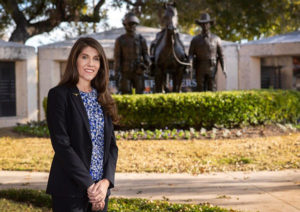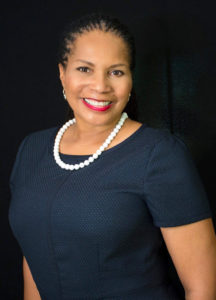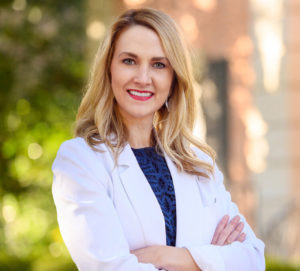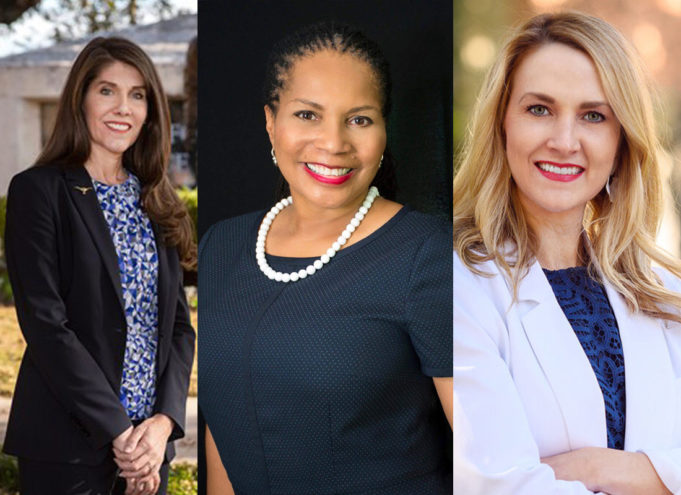Over her 10 years as Fort Worth’s mayor, Betsy Price grew her leadership position beyond its city charter-designated powers of voting as a member of city council and representing the city on all ceremonial occasions. Price spent long hours throughout her tenure supporting or leading initiatives like early reading, bike riding, and public health through Blue Zones.
Her seemingly boundless energy and optimism made her a crowd favorite even as her detractors believed she cared more about private business interests than social and economic justice or the plight of marginalized communities.
In January, Price announced that she would not seek a sixth term as mayor. The move removed the daunting challenges that outsider candidates typically face when running against an incumbent. Ten candidates, including two current city councilmembers, met the filing deadline. Frontrunner Mattie Parker, who has Price’s endorsement, has extensive experience in city dealings but was a relatively unknown until recently. Parker (MattieforMayor.com) worked as Price’s and city council’s chief of staff for the past five years. Her campaign, which has just over $466,000 on hand, is focused on inclusivity, education, and a strong local economy.
Retired physician and current District 3 City Councilmember Brian Byrd (Byrd4Mayor.org) has played an active role in revitalizing Las Vegas Trail on Fort Worth’s West Side. His campaign, which has around $500,000 on hand, is prioritizing low taxes, a job-ready workforce, and public safety. City Councilmember Ann Zadeh (AnnZadeh.com) has represented District 9, which includes downtown and the Near Southside, since 2014. Zadeh’s support of road diets and bike- and pedestrian-friendly city planning has literally transformed much of the city’s urban core. With $134,000 on hand, Zadeh’s campaign ranks third in campaign contributions.
Deborah Peoples (DeborahPeoplesforMayor.com) lost her bid to unseat Price in 2019 but earned 42% of the popular vote. After a three-decade career as an AT&T executive, Peoples began turning her focus to politics as chair of the Tarrant County Democratic Party. Steve Penate (StevePenateforMayor.com) vows to make Fort Worth a “sanctuary city” for the Second Amendment and to support low taxes for individuals and businesses. Engineer and lawyer Daniel “DC” Caldwell (DanielJCaldwell.WordPress.com) lists balancing city budgets and removing restrictive city ordinances as his top priorities. Fort Worth native Mike Haynes is an advocate for police oversight, improved stormwater drainage throughout the city, and expanded job readiness programs for high school grads.
Cedric Kanyinda (Cedric4Mayor.com) holds an MBA from Texas Woman’s University and says his top priorities are funding public infrastructure, government transparency, eliminating unnecessary regulations, and improved funding for first responders. Chris Rector (Facebook @VoteChrisRector) is a strong supporter of the Second Amendment and prioritizes “personal freedom, economic freedom, and a debt-free future.” Information on candidate Mylene George was not available.
Also on the ballot for the May 1 Fort Worth municipal election is a special election for Texas’ 6th Congressional District and several board openings at the Fort Worth school district, Tarrant Regional Water District, and Tarrant Community College.
We reached out to Byrd, Parker, Peoples, and Zadeh for this story. Byrd declined to participate.
Ann Zadeh
With a master’s degree in city and regional planning, years of zoning commission experience, and first-hand knowledge of the inner workings of the city, Councilmember Ann Zadeh said many of the city’s problems can be solved by carefully relocating existing public resources and improving city staff’s efficiency.
Some of the frustrations voiced by residents are due to zoning and ordinance decisions that were made years or decades ago, she said. As mayor, Zadeh would revisit and review those decisions to see if they still “make sense” for the people of Fort Worth.
Her priorities as the city’s leader would be to address affordable housing, public transportation, and availability and access to jobs.

Courtesy of Ann Zadeh’s campaign
“Having equal access to services for all citizens” is critical, she continued, and it plays into “racial equity. If residents don’t have access to all services or don’t feel safe calling the police, then we need to make strides to do a better job” as city leaders.
Rent and property taxes continue to sharply rise in Fort Worth, she said. The city, Zadeh continued, has a role to play in supporting and promoting mixed-income housing units that do not create concentrations of poverty. The city offers developers tax abatement (a temporary tax break) if those business owners set aside a set number of units as affordable housing. As Fort Worth’s population swells toward 1,000,000 residents, construction of new apartments and homes will help slow a rise in housing costs.
Zadeh said North Texans can no longer rely solely on building new roads and highways to solve future transit problems. As secretary and future chair of the Regional Transportation Council, the policy body representing 13 North Texas counties, Zadeh is promoting a focus on multi-model transit that supports bike lanes, rail, and other alternatives to cars.
“As mayor, I would continue to serve on the RTC and continue bringing some of [that federal] funding to focus on mass transit,” she said.
To support her third pillar, jobs, Zadeh would find ways to support local small business owners and innovators.
“A lot of times, the city’s economic incentives are geared toward someone who has $5 million to invest,” she said. “I would like to focus on fostering local businesses that already exist or people who have an idea for a business. They should have the backing of the city’s economic development office, [the nonprofit] TechFW, and Sparkyard,” a networking platform that connects entrepreneurs to nonprofit-based resources.
The COVID-19 pandemic demonstrated the strengths of some Fort Worth business communities, she said.
“During the pandemic, we saw how the businesses in the Near Southside worked together and supported each other,” she said. “Although some businesses were lost, there were businesses that actually opened during the pandemic. Small businesses rallied around each other. I don’t think that should only be the culture of the Near Southside.”
Much of Fort Worth’s aging infrastructure requires maintenance, Zadeh said, adding that the water pipes that cracked and broke during the recent winter freeze are one urgent sign that upgrades and repairs are needed.
City staff has “shifted some of our funding to doing maintenance and taking care of our aging infrastructure,” she said. “Taking care of what we have as opposed to purchasing something new [can lead to long-term savings]. People think of new purchases as an asset, but you have to take care of it, and it becomes a liability. We should take care of what we already have. By focusing on adaptive reuse of infrastructure, there is a higher return on investment.”
Police funding has become a talking point for several mayoral candidates. Zadeh said Fort Worth police need to have the funds required to do their jobs, but the peace officers should not be tasked with non-law-enforcement duties like checking on the unhoused population or responding to a mental health crisis.
“We need to make sure the police have the budget they need to provide public safety,” Zadeh said. “With the last budget, we started funding things that are now handled by persons other than police officers,” through the Community Emergency Response Team.
“I’ve been vocal of my support of police oversight,” she said, referring to her support for some type of independent citizen board to hear cases of police misconduct. Unlike many other major cities, Fort Worth lacks such a board. Zadeh said she also supports the formation of a citizen redistricting commission to handle how districts are drawn or redrawn.
As a city councilmember, Zadeh said she has been “out in the community” and developing a reputation as an elected official who is always accessible and approachable. As mayor, she said, she would continue to push for a responsive and transparent local government.
Deborah Peoples
Since moving to Fort Worth in 1975 and in the decades since, Deborah Peoples, who heads the Tarrant County Democratic Party, said she has seen a growing number of people and communities say they are being ignored by local officials.
“I have seen communities, not just of color, that feel left out,” she said, “whether it’s the far north because of rapid growth or the midtown area having flooding problems. Growth has given us notoriety, but it has also presented the problems that come with growth. It would be my job to pull all of these communities to one table, so people feel included.”
She said her approach as mayor would be to create “One Fort Worth.”

Courtesy of Deborah Peoples’ campaign
The idea, she said, is to bring everyone together to address issues like public safety, budgeting of city funds, homelessness, and the availability of mental health resources.
As mayor, Peoples said, she will recommit to the 22 recommendations made by the city-appointed Race and Culture Task Force, the volunteer group tasked with addressing civil unrest following the heavy-handed arrest of Jacqueline Craig and her two teenage daughters in 2017. City leaders have backpedaled on at least one final recommendation — the formation of an independent redistricting commission (IRC) that allows citizens to redraw city council districts. City leaders have instead moved forward with a redistricting task force.
“I believe in an IRC,” Peoples said. “The citizens should be picking their districts. Representatives should not be picking their citizens. That’s a backwards model.”
Beyond establishing an IRC, Peoples said elected officials like mayors need to admit when they make mistakes, such as not honoring the city’s commitment to the Race and Culture Task Force’s call for an IRC.
“People have lost trust in government,” Peoples said. As mayor, she said, she would “honor the task force recommendations. I don’t have a problem telling people [the city] made a mistake. I would lobby the city council to go back and look at an IRC.”
Peoples is ready to tackle the divisive issue of policing practices.
“Of course, we want to be safe in our homes,” she said. “As a homeowner, I want the police to be there if I call, but I also want them to be transparent. We just voted to extend the Crime Control and Prevention District. We need to look at that budget and how that money was spent.”
Funds from the $86.5 million district, which is funded by a half-cent tax, used to be managed by volunteer citizens. Former Mayor Mike Moncrief disbanded that committee 10 years ago and placed city council and the mayor in charge. Peoples said that was a mistake.
“One way to build trust is to look at that budget and to make sure we look at spending in communities,” she said. “If we put money into intervention and mental health, that helps the police. My brother was a policeman. I get it. I want to look at improving lives in communities and not just policing.”
The “One Fort Worth” approach would include participatory budgeting that allows locals to have direct input on city spending before those expenditures are approved, Peoples said. Fort Worthians also deserve a robust public transportation system, she added. Light rail or other programs would lighten the financial load on people who would rather forgo car ownership, and the lower reliance on cars would slow the dangerous effects of climate change, she said.
The recent Texas freeze also highlighted the plight of Fort Worth’s unhoused population, she continued.
“I’m so tired of studying the problem,” she said. “We segregated our homeless [into the East Lancaster Avenue corridor]. People are not all homeless because they are all mentally ill or addicted to drugs. These are people, and COVID has increased homelessness. One thing we need to do is beef up our service to the homeless. What would happen if we made housing projects available for the homeless instead of tearing them down?”
Mattie Parker
When Mattie Parker learned that Price was not seeking a sixth term, the mother of three said she asked herself, What kind of Fort Worth do I want to raise my kids in?
“This is a unique opportunity to unite our city, move us forward, and push us through a crossroads as a city,” she said. “I have three children. I think that’s a strength. I want to use my experience to help my city.

Courtesy of Mattie Parker’s campaign
Community unity, strong schools, and economic development top the list of priorities for the mayor hopeful.
“We have to bring the city together,” Parker said, adding that politics have become too divisive as of late. “I believe in compromise. I don’t think that is a dirty word. We need to infuse transparency and community ownership into dealings at City Hall. We have to get back to listening and making sure people feel welcome. If you look at [what protestors are saying], are we really listening? I would argue that we really aren’t.”
Attaining the “proverbial breaking of the bread” may take numerous small-setting meetings, she said. City staffers could do a better job of getting their message out via social media, she added. The February freeze that knocked out power for millions of Texans highlighted the need for city officials to improve lines of communication during emergencies, she said.
Although school districts are governed by trustees, the City of Fort Worth has a significant role to play in improving education for every student in or near Fort Worth, she continued.
Many of the societal problems we are concerned about “come down to opportunities for education,” she said.
Around 23% of our residents “make it to a two- or four-year college if they grow up in a low-income community,” she said. “I am not pointing the finger at school districts. It is the responsibility of our mayor and city council to rally with every school to make sure every student has access to a quality education. Our success is tied to the education of the children who are in classes today.”
Helping students return to classrooms safely, holding joint meetings between city and school district leaders, and coordinating bond programs to ensure that Fort Worth and its school district have aligned goals are all ways that Parker said she will use city resources to support local schools.
Whether a parent chooses to homeschool or to find a charter, private, or public school for their children is a decision that families should be able to make without being criticized, she continued.
“I want to soften the rhetoric,” she said. “At the end of the day, we need to understand that every parent needs to make the best decision for their children.”
Parker said that economic development requires a global perspective and local focus on small businesses and entrepreneurs.
“What is the next big corporate [relocation] opportunity that may land in Fort Worth, and what are we doing to tell the Fort Worth story across the country?” Parker asked. “We have to compete on a global level. Quit worrying about Dallas and Frisco and think about what [business leaders and innovators] are doing in Germany and Asia. Entrepreneurs are the ones who are building businesses. We need to think about growing the next Apple or Amazon success story right here.”
The city has a role in supporting startups through small grants or networking, she continued. Fort Worth needs “innovation incubators” that nurture and support startups, she said.
As Fort Worth grows, Parker said, the city has a role to play in ensuring that there is an adequate supply of homes for folks of all economic levels. The mayor can play a positive role in destigmatizing affordable housing.
“Affordable housing is what you or I needed out of college or what our firefighters, police officers, and teachers” need, she said. “Affordable housing allows families to live in quality neighborhoods at a level they can sustain.”
Parker said she is supportive of the city’s redistricting efforts, which are being led by a city council-appointed task force. When asked about the need for a citizen oversight committee to hold Fort Worth police officers accountable when misconduct is documented, Parker said she is waiting to see the final recommendations of Fort Worth police monitor Kim Neal.
Parker’s name is often closely associated with Price, given their years of working together and the mayor’s recent endorsement of Parker.
“I learned a lot from the mayor, but I also learned a lot from other people I worked for,” Parker said. “It’s not dissimilar to working for a boss who may have mentored you. You weren’t the 2.0 version of that person. There will always be certain [learning moments from Price] that I take to heart, but I may do something different. Our city is in a different place. In 2021, we are coming out of COVID, and we have opportunities we need to seize upon.”













Should probably also mention that Brian Byrd is a pretty noxious transphobe, perhaps?